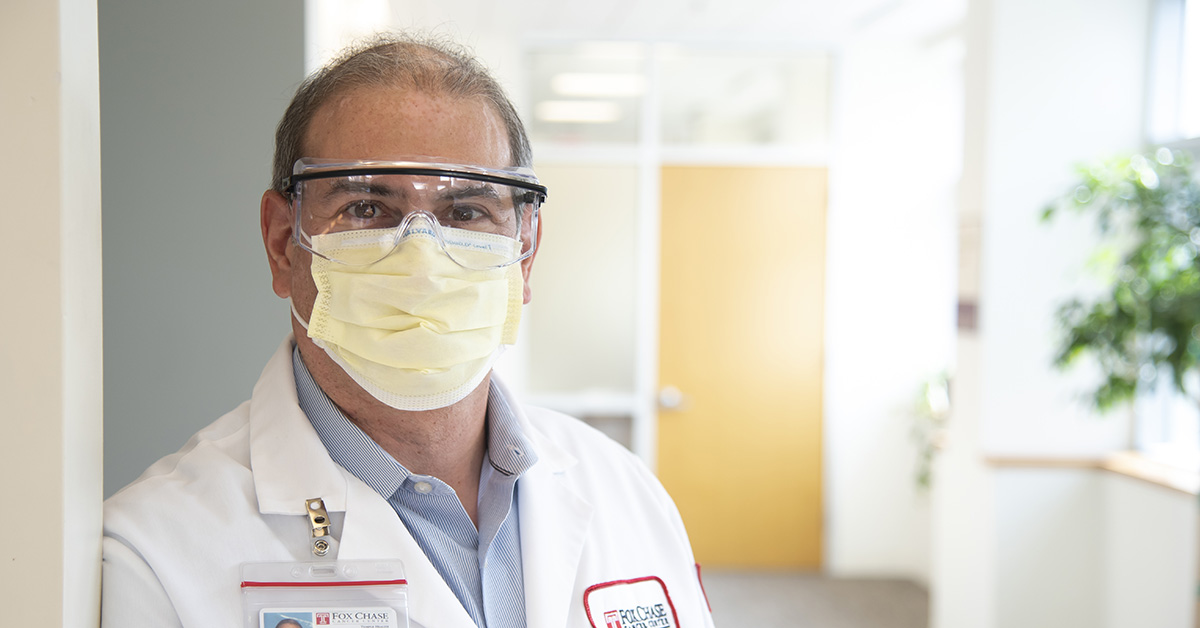
PHILADELPHIA (February 7, 2022)—According to a new study from researchers at Fox Chase Cancer Center, mRNA vaccine for COVID-19 is just as safe for people with cancer as it is for cancer-free individuals.
The researchers tracked short-term side effects from more than 1,753 recipients of the Pfizer BNT162b2 vaccine and found no additional reactions for patients undergoing active cancer treatment (surgery, chemotherapy, immunotherapy, or radiation therapy) or who had completed treatment.
“Patients, their families, and their medical caregivers should absolutely find these results reassuring. We surveyed almost 2,000 patients and found that cancer patients aren’t at risk for any unexpected reactions to being vaccinated compared to people without cancer,” said Eric M. Horwitz, MD, FABS, FASTRO, lead researcher and chair of the Department of Radiation Oncology at the Lewis Katz School of Medicine at Temple University. Fox Chase is part of the Temple University Health System.
“We now have the data and the clinical experience from thousands and thousands and thousands of cancer patients who have been vaccinated. We know that the mRNA vaccines are safe and are absolutely the most effective way to prevent hospitalization and death from COVID-19,” said Horwitz, who is also the Gerald E. Hanks Endowed Chair in Radiation Oncology at Fox Chase.
The results come from in person, phone, and online surveys given to people who received two doses of the mRNA vaccine three weeks apart between February 16 and May 15, 2021. A total of 1,183 people with a history of cancer responded to both surveys, with 17.8% then currently undergoing treatment.
Respondents reported experiencing pain at the injection site, muscle pain, joint pain, fever, chills, headache, nausea, and fatigue at similar rates as those reported by people without cancer from the original clinical trials for the vaccine. Adverse effects for people undergoing immunotherapy also mirrored those in the general population.
“It’s crucial that cancer patients get vaccinated against COVID-19 because we know they can be particularly vulnerable to infection and its consequences, but some people have expressed concerns about possible reactions from the vaccines,” Horwitz said.
“Before this study, there wasn’t a lot of data specifically on the cancer population so we made sure to collect and report this information to help both patients and physicians make informed decisions to get mRNA vaccines,” he added.
“Getting vaccinated against COVID-19 was an opportunity for me to take control and help protect myself,” said Dan Burkus, who has been treated at Fox Chase. “Undergoing cancer treatment and follow-up can be terrifying, especially during a pandemic. This new proof that people with cancer won’t have any extra side effects from the mRNA vaccines is one less thing to worry about and one more reason to get the shot.”
“The investigators convincingly showed no greater incidence of side effects in patients with a history of cancer, and in fact recipients with a history of cancer had lower rates of pain at the injection site,” said Natalie Callander, MD, of the University of Wisconsin Carbone Cancer Center, a member of the National Comprehensive Cancer Network® (NCCN ®) Advisory Committee on COVID-19 Vaccination and Pre-Exposure Prophylaxis.
“Over half the patients in this large prospective study had a history of cancer and about 18% were on active treatment,” added Callander, who was not involved in the research. “This study demonstrates that cancer patients experience no greater rate of complications and should help to counteract misinformation about COVID-19 vaccinations. This report provides additional reassurance to practitioners and patients that COVID-19 vaccines are safe and should be offered without hesitation in accordance with CDC and NCCN recommendations.”
The study, “Adverse Events Reported by Patients With Cancer After Administration of a 2-Dose mRNA COVID-19 Vaccine,” was published in JNCCN—Journal of the National Comprehensive Cancer Network.